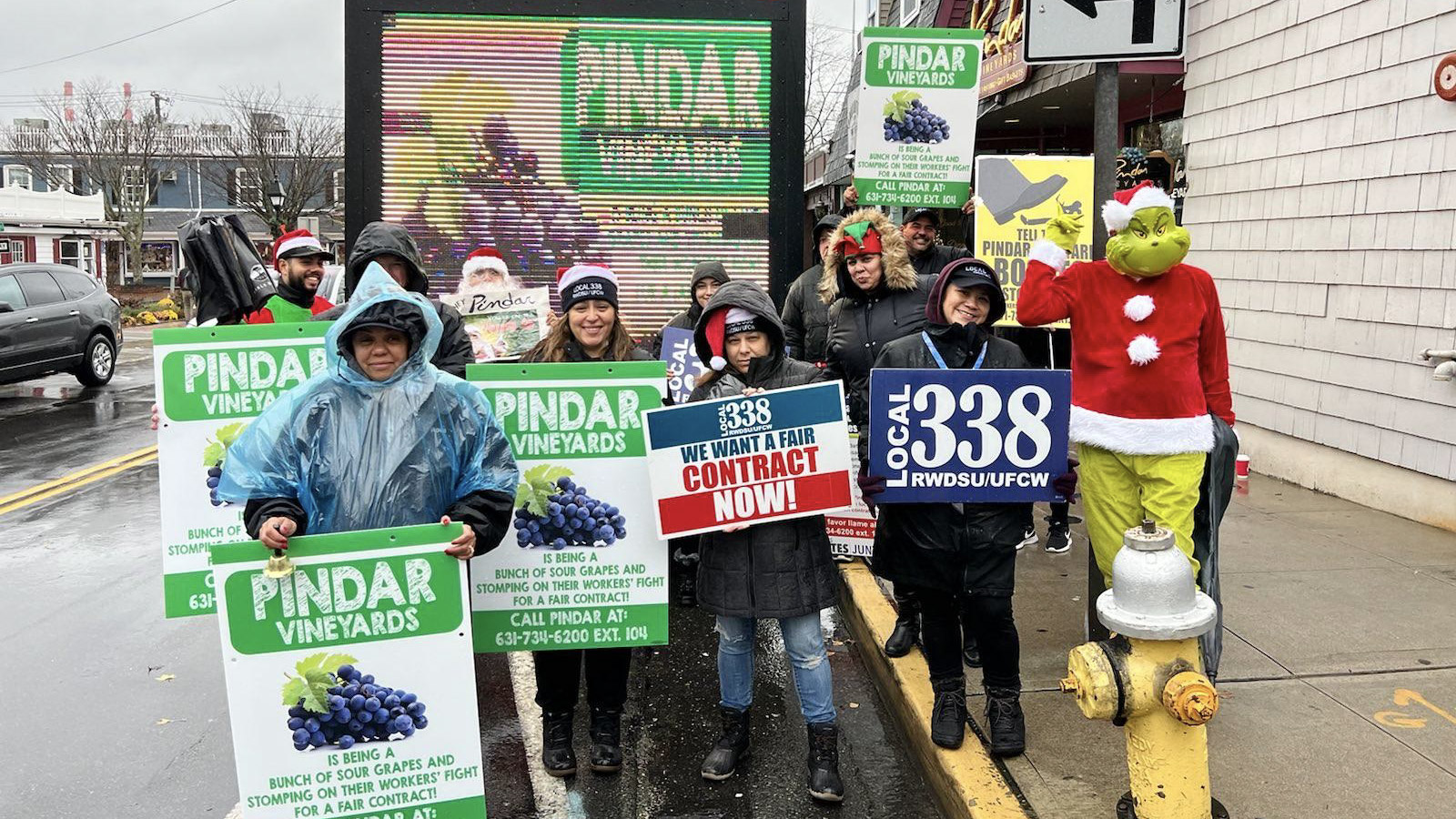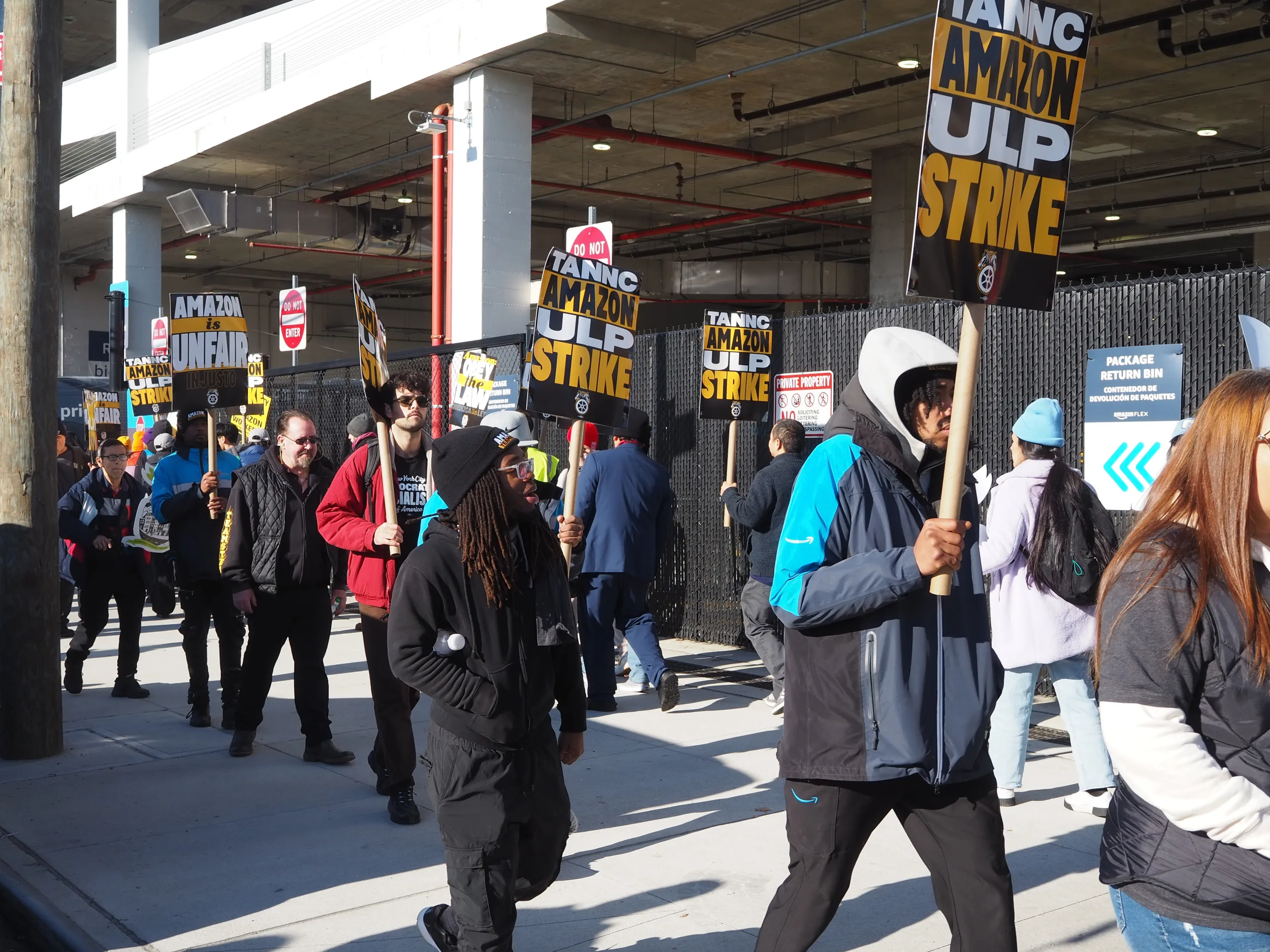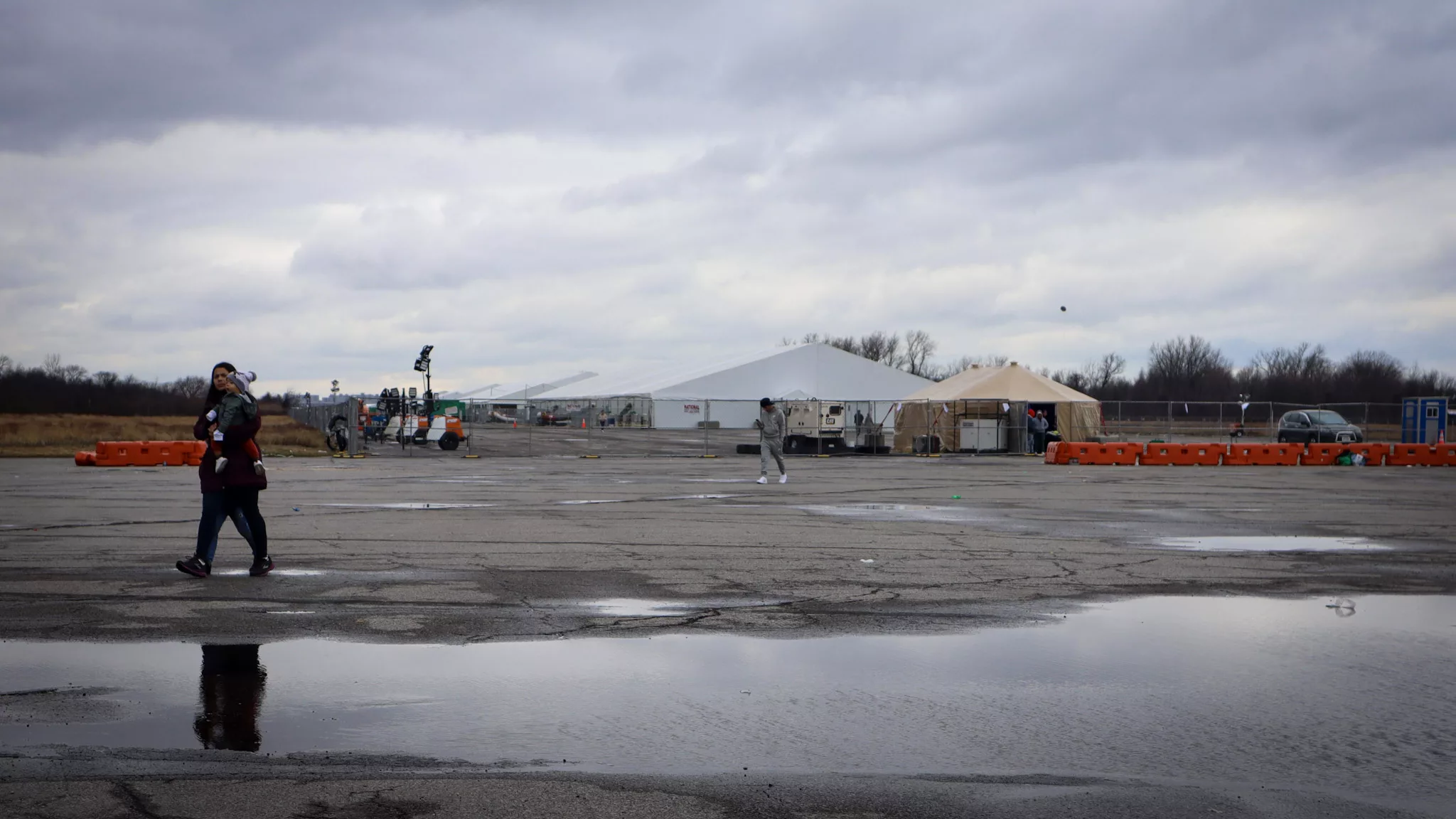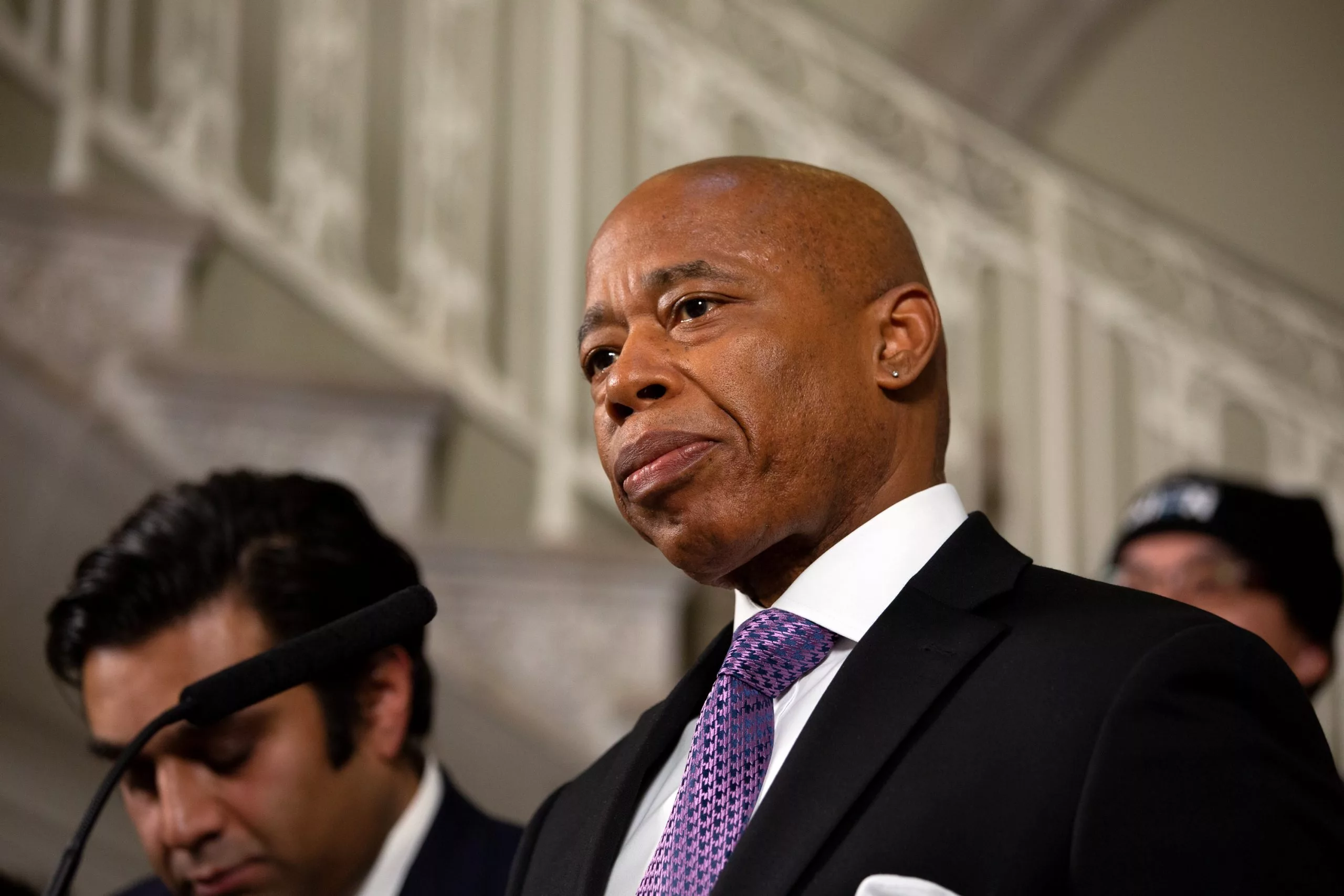Farm workers on Long Island struggled for three years to form New York’s first farm workers union at Pindar Vineyards. After establishing their union in 2021, to much fanfare, they have embarked on yet another struggle: winning a fair contract.
More than a year has gone by and Pindar Vineyard’s owners have refused to negotiate on the first labor contract that would guarantee the farm workers increased wages, paid sick leave, overtime pay, and paid holidays.
Since first arriving in the U.S. from Honduras in 2001, 47-year-old Martí Zambrano Diaz has worked nearly every day at Pindar Vineyards on the far eastern end of Long Island. For 21 years, Diaz toiled over the vineyard’s rich soil, pruning its trees, raking its leaves, and harvesting sixteen varieties of grapes, including Merlot and Chardonnay. For 63 hours a week, six days a week, Diaz has endured the long hours just to keep food on the table for his wife and four kids.
Exposed to the harsh arctic winds sweeping in from the Atlantic, his hands would cramp and ache from the cold, he said. They say the body never forgets trauma, and for Diaz, the years of physical labor have caught up to him. “With so many years of working here obviously, I’m not the same anymore,” he said. “It takes a toll on your body. My bones and my feet hurt.”
Due to federal labor law that bars agricultural workers from earning overtime pay, Diaz and 11 of his fellow workers have not been entitled to holiday pay, overtime pay or paid time off. Farm workers have historically been excluded from the federal protections guaranteed for other workers under the National Labor Relations Act (NLRA). Under federal law, farm workers, the majority of whom are immigrant workers of color, are also denied minimum wage, workers’ compensation, and the right to form a union. While states are able to circumnavigate federal law by providing those rights to their agricultural workers, only four states have done so.
With little legal leverage, the 12 Pindar Vineyards workers believed there was not much they could do. They had approached management many times before about pay increases and improved working conditions only to be rebuffed, the workers, who make between $15 and $17 an hour, said. Diaz, who has worked for the company for over two decades, makes $17 an hour.
“In the past when we tried to ask the owner to receive an increase of our wages, but they said to us no and if we didn’t like it we could leave, there’s the door,” said Diaz.
Yet all that changed in 2019 when New York State passed the historic Farm Laborers Fair Labor Practices Act. For the first time in the state’s history, farm workers were guaranteed overtime pay, a day of rest each week, disability and paid family leave, unemployment benefits as well as the right to organize a union. Soon after, in February of 2020, the 12 workers at Pindar Vineyards began organizing the state’s first farm workers union.
“A group of us got together after seeing the injustice, after seeing that we were not able to receive any increases in our wages,” said Diaz. “After seeing the disrespect from the farm owners we decided to come together and join a union. We were not going to back out and we are going to stay together until the end.”
In May 2021, Pindar farm workers voted unanimously to join Local 338 RWDSU/UFCW. Almost immediately, workers like 41-year-old Jorge Ramirez said that having a union significantly boosted his sense of self-worth. An immigrant from Guatemala, for the entire 19 years he worked at the vineyard, Ramirez said he was never treated with respect. In the weeks following the union vote, the boss’s tone began to change.
“The difference now is that ever since the union is here, now when the boss speaks to us they speak to us with respect,” said Ramirez. “Whenever they need us to do something they ask, please can we do this? In the past, they did not do that.”
Richard Witt, Executive Director of Rural & Migrant Ministry, which has helped organize farm workers in New York for over 20 years, says the historic win at Pindar Vineyards is an example for other farm workers nationally.
“This is a critical step in the farm worker movement in both New York, and I would argue across the country because really there has been little that has happened outside some of the efforts in the west coast,” he said. “Farmworkers in New York, on the eastern end of Long Island, their success sends a powerful message to other farm workers across the state that this is possible and that your voice can be heard.”
But more than a year has passed since the workers first organized, and the union says management has been stonewalling them in an attempt to delay a fair contract.
“They are basically refusing,” said Noemi Barrera, Union Representative for Local 338 RWDSU/UFCW. “They are not providing fair wages, health insurance, or any sort of unit protection. They are using delaying tactics at this point. It looks like we are going to have to ask a third party, a mediator to join.”
Every weekend for the past several months, members of RWDSU/UFCW have been picketing outside Pindar Vineyards, demanding that the company come to the table and reach an agreement. According to Barrera, the company attempted to block the picket by parking tractors in front of the vineyard so the organizers would not be visible.
Pindar’s tactics are not unique. Employers often delay negotiations as long as they can in an effort to disrupt a union and discourage workers. A union’s chances of securing its first contract within a year are less than 50 percent. If the employer delays the process long enough, they can potentially implement an agreement that is more favorable to them than to the workers.
New York State Senate Labor Chair Jessica Ramos, who was one of the chief supporters of the Farm Laborers Fair Labor Practices Act, has called out Pindar for its delaying tactics. “We did not pass the Farm Labor Fair Labor Practices Act as a suggestion,” she said. “Pindar’s workers have a right to organize, they have a right to bargain, and I urge management to come to the table.”
Pindar Vineyards did not respond to Documented’s request for comment.
In the meantime, aside from the symbolic victory of winning a union, not much else has changed for the workers. They still work long hours, they still don’t have holiday or sick pay. Still, seeing how far they have come, Diaz is determined to keep fighting.
“What we need is for them to finally come to an agreement and sign this contract which is what they are refusing to do,” he said. “We are the ones that do the work here. We work long days during the winter and summer months. We deserve an agreement and for them to sign this contract.”















